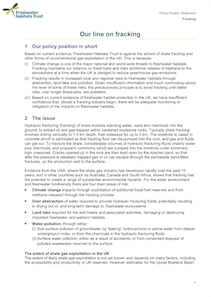Critical Review
A Critical Review of the Risks to Water Resources from Unconventional Shale Gas Development and Hydraulic Fracturing in the United States published by ‘Environmental Science and Technology’ identified four potential risks for water resources:

- The contamination of shallow aquifers with fugitive hydrocarbon gases (i.e. stray gas contamination) which can also lead to the salinization of shallow groundwater through leaking natural gas wells and subsurface flow.
- The contamination of surface water and shallow groundwater from spills, leaks and/or the disposal of inadequately treated shale gas wastewater.
- The accumulation of toxic and radioactive elements in the soil or stream sediments near disposal or spill sites and
- The overextraction of water resources for high volume fracturing could induce water shortages or conflicts with other water users, particularly in water scarce areas.
Environmental Science and Technology – Abstract
Freshwater Habitats Trust Against Fracking
Based on current evidence, Freshwater Habitats Trust is against the advent of shale fracking and other forms of unconventional gas exploitation in the UK. This is because: 
- Climate change is one of the major national and world-wide threats to freshwater habitats. Fracking maintains our reliance on fossil fuels and risks additional release of methane to the atmosphere at a time when the UK is pledged to reduce greenhouse gas emissions.
- Fracking results in increased local and regional risks to freshwater habitats through abstraction, land take and pollution. Given insufficient information and much controversy about the level of some of these risks, the precautionary principle is to avoid fracking until better data, over longer timescales, are available.
- Based on current evidence of freshwater habitat protection in the UK, we have insufficient confidence that, should a fracking industry begin, there will be adequate monitoring or mitigation of the impacts on freshwater habitats.
Policy Position Statement– Freshwater Habitats Trust
